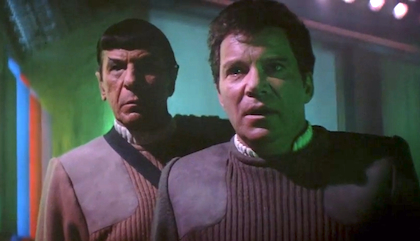+the scene
CINEMA SECOND CHANCES: 'Star Trek V: The Final Frontier' (1989)
Written by Greg McIver. Published: January 05 2015

Star Trek V: The Final
Frontier is probably the least-liked film in the entire
(original) Star Trek film franchise. Released in 1989 and
directed by some guy named William Shatner, Star Trek V tells the story of Kirk and Spock’s encounter
with a Vulcan named Sybok who turns out to be Spock’s half-brother.
Sybok is obsessed with the idea of traveling to the center of the
galaxy in order to find a planet called Sha Ka Ree, otherwise known
has "Heaven" to us humans. Sybok and his band of disciples take
over The Enterprise and begin converting members of the
crew to their cause. To add to their problems, a rogue Klingon ship
and crew has decided to pursue Kirk and his crew for the potential
honor of destroying The Federation’s best ship and its best
captain.
Let me start off by saying
that I get it. I truly do. There are a good amount of things in
this movie that do not work. So, in the hopes of being totally
fair, let me first list the cons (not Khans) of the movie before I
go on to explain why this is actually a very good movie
and certainly better than many other entries in this film
series...
CONS
- The special effects in this
flick are pretty terrible. I think that most of the budget had
already gone into paying for the after-party of Star Trek IV:
The Voyage Home.
- The campfire scene and camp
in general.
- So when they get to Sha Ka
Ree, they do not find God but instead a malevolent entity that
pretends to be God for two minutes and then reveals himself to be
just an evil thing that wants to shoot lasers at the crew and
hijack the ship. We never really find out what this thing is, and
in we’re not really sure what it was in the first place that drew
Sybok to the planet. Was it sending messages to Sybok? Did Sybok
get confused and go through the wrong Great Barrier? I will be the
first to admit that these are questions that could’ve done with
some answers.
- The planet of Sha Ka Ree
lies at the center of the galaxy. Kirk says earlier in the film
that the center of the galaxy can’t be reached. Then they just sort
of go there without any problem. I guess maybe Scotty was able to
work some sort of miracle with the engines or maybe Fake God helped
pull them there? I’m pretty certain were never going to find out
anytime soon, unless Mr. Shatner himself decides to comment on this
article.
Okay, I guess we can add that
trailer to the list too. Yeesh! But that’s really it, folks. Just a
few, albeit legitimate, little complaints. But for my money, this
is not enough to actually handicap the entire movie. Now, let me
move on to the list of pros that most people tend to overlook when
they discuss this film...
PROS
- The story that Shatner came
up with is actually pretty great despite the rocky little shortcuts
he took in order to bring it to the screen. Space is such a vast
and infinite place, and the crew of The Enterprise have
spent years exploring it while studying countless species. So, it
was only a matter of time before the question of “who created all
of this?” was raised. The character of Sybok is a zealot who has
allowed this question to obsess in his mind for far too long, and
as such he has become fanatical about it. He appoints himself as
leader of the cause and truly believes in his heart that he is the
one chosen to finally reveal the true face of God. Such radical
thoughts can lead to arrogance, and even at the end of the film, he
admits that it was perhaps his ego that was one of the driving
forces behind his quest. And yet his convictions are still genuine
and strong, and they are not presented to us in any kind of gaudy
or one-dimensional way. To borrow a phrase from Spock, Sybok is a
man of deep feeling, and that for one can easily be counted as good
thing because it shows that he is a rich character with motivations
that you can somewhat empathize with at times.
- The comraderie between our
three leads has been a strong force throughout the series, and this
film captures it and expands on it wonderfully. Oh I know people
love to complain about the aforementioned campfire scene, but I for
one count that as a major plus in the movie’s favor. These men have
been through situations that defy logic for the most part. They
started as just members of the same crew, and now their
relationship has extended to a friendship so strong that it
literally transcends death. So, after all of the adventures,
battles, and heartbreaking losses, it’s actually nice to see these
three just sit back and reflect upon their lives and what they mean
to one another. There is certainly more profundity in what they
have to say (before they break into the campfire songs) about life,
family, friends, and death than pretty much anything you can find
in any of the Star Wars movies. (Fight me!)
- Sybok has the ability (I’m
guessing through his Vulcan mental prowess) to bring a person’s
deepest pain to the forefront of the mind. Once the pain is
exposed, he makes the person confront it and draw strength from it.
The experience is so cathartic and relieving that those who
experience it will do anything for Sybok in return. This is another
opportunity that the film takes for us to really become familiar
with our lead characters in ways that we never have in the past.
Spock has a vision of his birth, and we see that his pain is drawn
from the fact that his father never truly accepted him due to his
half-human nature. We’ve heard this before but have never really
seen the true emotional impact that it has had on Spock until now.
Doctor McCoy is shown a vision of his dying father, and McCoy must
relive the moment where he makes the decision to take his father
off of life support. The tragedy in this act is that, apparently, a
week or so later, the doctors found a cure for the disease that was
killing his father. Doctor McCoy acted in order to spare his father
pain and yet had he waited, his father might have had a full
recovery. It’s one of the saddest and most moving moments in all of Trek history. And finally we move on to James Kirk.
Captain Kirk is heartbroken not just because he is able to see and
understand the deep pain that his friends have carried for all
these years, but because, as close as he had become to both of
them, he never knew about it. And yet Kirk refuses to take part in
Sybok’s form of therapy because he declares that people learn from
their pain and draw strength from its existence, not its
abandonment. Whether he says this out of fear, stubbornness, or
true faith in his own life choices, is left up to interpretation.
How anybody can ignore the strength of this scene and the moments
within in favor of complaining about warp speed velocity errors is
beyond me.
- Well, that’s it. I know I
only presented three bullet points and that there are more
underneath the Con section, but in the end, it’s about the quality
and not the quantity. Yes, there are more holes in this movie than
there are on Nimbus 3, but in the end, they matter little. It is
the emotional content and the profound things that the film has to
say about friendship and personal conflicts that elevate this film
miles above a lot other dreck out there that’s calling itself good
sci-fi. Give this movie another watch and please rethink any
negative thoughts you've ever had about it. For many Trek fans, this film has been like a deep pain that they have carried
with them for many years. Well at the risk of sounding like Sybok,
it is time to confront that pain and draw not only strength from
it, but enjoyment and a new appreciation for it and the Trek series as a whole.
(Screenshot via YouTube)
- Greg McIver, YH
Staff



